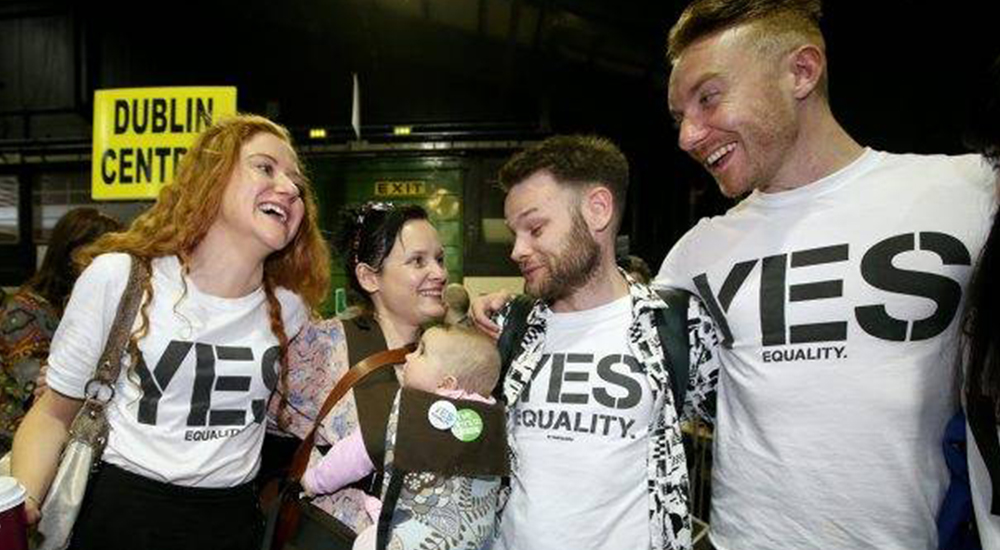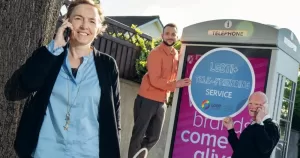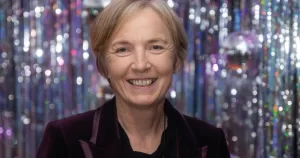“These children already exist. What are we to do with them? Send them to Mars?” Grainne Healy’s rhetorical question cut through the Prime Time debate on Marriage Equality like a knife. It was one of the moments in 2015 when we knew that the referendum was going to pass. Because the people wanted it to and because it had to. Yet here we are, four years on, we may have marriage equality, but we still don’t have equality for all families or children.
The protection of children of LGBT+ families was one of the drivers for change in the 2015 marriage equality referendum. However, we are still a long way short of fully inclusive legislation that recognises ALL of our families.
We all thought that the referendum was the hard bit, so why are we still waiting for legislation for equal rights for all families, including rainbow families.
So what needs to happen? This area is quite complex, and a piecemeal approach will get us part of the way; where specific families will be recognised over time. In the long-term, however, the Children and Family Relationships Act 2015 (CFRA 2015) requires a complete review and overhaul to plug the legal holes which are having a devastating real-life impact on families. And in doing so, they are potentially breaching their right to family life under the European Convention on Human Rights.
Recent amendments to the 2015 Act have seen adoption provided as a direct pathway to parenthood for LGBT+ people as individuals or couples, and it also enables co-parents who are not otherwise entitled to legal recognition of parentage to become a parent of a partner’s child. But it does not cover surrogacy, home inseminations or reciprocal IVF using donor sperm.
And, before we go anywhere on this issue, let’s not forget that the best interests of the child are protected by laws that mean in practice that the child can be fully cared for by the adults they love and call parents.
Children of rainbow families should have the ability to create a legal relationship with both intended parents, and those parents should have the legal rights to care for the child. At the moment, though, certain aspects of the 2015 Act operate to treat some children less favourably than others. The reality of the child’s actual family relationships must be legally recognised and protected and should drive the legislative response.
The General Scheme for the Assisted Human Reproduction Bill, which mainly deals with surrogacy is mired with inconsistencies and gaps. A Report from the Joint Oireachtas Committee this year on the scheme was underwhelming, to say the least, and without vision. Currently, in Ireland, no enacted legislation addresses surrogacy as a pathway to parenthood.
As a modern European country, this is not good enough, and we need to get our house in order now.
Some of the issues which require urgent attention:
Home insemination
Home insemination using donor sperm has been and may continue to be a common pathway to parenthood for many same-sex couples where one partner carries the child through pregnancy. Unfortunately, the Children and Family Relationships Act 2015 does not recognise this type of conception.
So, for example, if a female same-sex couple artificially inseminates at home using donor sperm, the woman who does not carry the baby has no legal parenting rights at birth. But if the insemination took place in a fertility clinic, she would. There are a number of reasons for this, one of which is that the CFRA 2015 is focused on the clinic setting which allows for certain documents to be generated independently of the intended parents, which are required for the recognition of parentage under that Act, e.g. records of consent, records of the procedure actually performed, etc.
Another complicating factor concerning known sperm donor is that the child has recognised rights concerning the recognition of the donor as their father. However, in other countries, they have found solutions. For example, in the UK, for example, an automatic presumption of parentage operates in favour of same-sex couples and civil partners.
Donors
If parents chose to have a known donor (eggs or sperm) for example, to ensure their child’s right to an identity, then they are penalised further. In cases of ‘unknown’ donors, parentage may be retrospectively allocated to an intended parent under the 2015 Act. But not where the donor is known. This has a particular impact on female same-sex couples who choose reciprocal IVF. Also known as ‘shared motherhood’ this is where one intending parent donates her eggs for IVF and implantation in the other intending parent’s womb.
Women will often choose this so that both intending parents have a biological link to the child and so that the child’s right to identity is protected. No enacted legislation addresses reciprocal IVF as a pathway to parenthood, and this is a situation which must be addressed for the child and the intended parents.
Until all parenting pathways are not covered under the 2015 Act, this is, in my view a discriminatory legal landscape within family law but more importantly, it is causing real distress for children and parents in rainbow families. We need to live up to the words and values of the marriage equality referendum and address the remaining legal gaps to ensure that all children have legal recognition of their family. We are on a journey to full inclusivity but have a great deal of path to go yet.
The next Oireachtas must ensure that this is a priority issue. Just because we changed the Constitution, it doesn’t mean rainbow families have equal rights yet. The Oireachtas must step up now and do its job.
© 2019 GCN (Gay Community News). All rights reserved.
Support GCN
GCN is a free, vital resource for Ireland’s LGBTQ+ community since 1988.
GCN is a trading name of National LGBT Federation CLG, a registered charity - Charity Number: 20034580.
GCN relies on the generous support of the community and allies to sustain the crucial work that we do. Producing GCN is costly, and, in an industry which has been hugely impacted by rising costs, we need your support to help sustain and grow this vital resource.
Supporting GCN for as little as €1.99 per month will help us continue our work as Ireland’s free, independent LGBTQ+ media.



